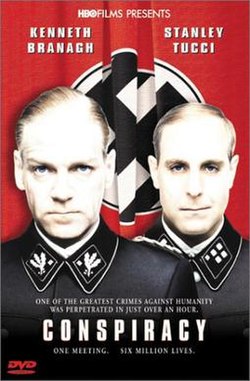DECEMBER 26, 2022 – I’m well into that paradoxical stage of life when the more I learn, the more I learn I haven’t. This is particularly true of my knowledge of history; not just what’s “fascinating” but what’s necessary for an understanding of the world and essential to counter repetition of its darkest moments.
Some historical elements—people, places, events—I’ve read about or heard mentioned in a general context but not in sufficient detail. The Wannsee Conference is one such historical marker that I’d skimmed over until late last week. All that changed when my oldest sister recommended the 2001 film, Conspiracy, directed by Frank Pierson and starring Kenneth Branagh, Stanley Tucci and Colin Firth. Much of the actual script, it turns out, was provided by a top echelon of Hitler’s henchmen; more specifically, the stenographer’s record of a meeting held on January 20, 1942 at a Nazi conference center on the placid shores of Lake Wannsee, eight miles south of Berlin.
The “center” was an Italianate mansion built in 1914 by a German industrialist, who later sold it to another wealthy German, who, in 1941 sold it to the Nazi Party. The Nazis used it for meetings and entertaining.
The infamous “conference” was chaired by the high-ranking, arrogant SS officer and Chief of the Reich Security Office, Reynaud Heydrich (played by Branagh), chief architect of the “Final Solution of the Jewish Question.” His chief deputy, Adolf Eichmann (Tucci), was the earnest “yes-man.” Assembled around the table were another 13 agents of the Holocaust—various “Ober”, “Über” and “Gruppen” führers of the Thousand-Year Reich, which lasted only 12 and a half years but long enough to slaughter six million Jews and millions of others and wreak havoc across Europe from Normandy to Moscow; from Narvik to North Africa.
The film is replete with fully-intended ironies—the peaceful, bucolic environment outside the mansion while the nation and world were at war; carefully calligraphed place cards for the attendees; culinary delicacies served on fine, silver trays by a legion of servants; Heydrich’s highly developed knowledge of classical music (he was an accomplished violinist); lawyers—each a “Doctor” in the professional tradition—insisting that the “Final Solution” be carried out within a strictly observed “legal” framework (based on the Nuremberg Laws) to avoid “chaos” and to preserve a lucrative and necessary source of the Reich’s slave labor. The ultimate irony, however, was the total absence of violence, not counting the clatter of a food tray accidentally dropped on the floor and a snowball fight among the bored drivers waiting outside. (Eichmann put his boot down on both offenses.)
Branagh’s performance—and Tucci’s in his supporting role—are masterful . . . again, helped immensely by the gob-smacking “script.” In watching the film, I was jolted by many thoughts, three of which were: 1. How can it be that anti-Semitism is alive and well still today, nearly 81 years later? 2. Depravity and refinement can wear the same suit or uniform; and 3. Everyone I know should watch this film.
(Remember to subscribe to this blog and receive notifications of new posts by email.)
© 2022 by Eric Nilsson

4 Comments
I’m intrigued by your choice of the photo that accompanies this post. Is the sculpture by Gustav Vigeland? (And I definitely need to see the movie!).
Yes, Jeanne–I took the photo in Vigeland Park in Oslo in 2014. Nothing soft about Vigeland’s work, but what it lacks in suppleness it exudes in power and permanence.
Eric, thank you for the reference to this movie. I watched it tonight. I knew about the Wannsee conference but I did not know there was a stenographic record of it. The businesslike way in which they agreed on the “final solution” was extremely chilling to watch. On the other hand, it reminded me of many business meetings I attended in which terrible decisions were made, although obviously not of such immense import. Again, thank you for the recommendation. If you are looking for something to read, I can recommend Philip Kerr’s novels about Bernie Gunther, many of which were about Reinhard Heydrich.
Yes, Ginny–I thought the same thing: business meetings where things went off the rails. The worst one: a visit by a rep of the “Government Affairs” department who passed out “contribution packets” for each of us to accede to automatic deductions from our paychecks for the corporate lobbying efforts. I’ll never forget the guy’s exact words:”We don’t care if a Congressperson or Senator is a Democrat or Republican. What we care about is access, and money gives us access.” I couldn’t believe it. I said, “Is anyone else in the [conference] room as outraged as I am by this overt corruption of our democratic system?” No one else said a peep. I was later excoriated by my boss for “making trouble.” I’ll have to check out those Philip Kerr novels. Today I stumbled across a movie about Father Rupert Mayer–a Catholic priest who stood up to the Nazis. I’d never hear of this hero.
Comments are closed.